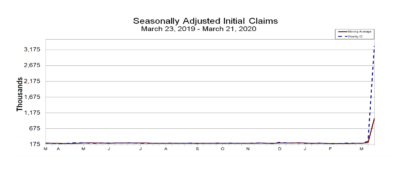Advertisement
Massachusetts Unemployment Claims Skyrocket, Shattering All Previous Records
148,000 Massachusetts residents applied for unemployment last week, a nearly 19-fold increase over the previous week's 7,449 unemployment claims.
Across the country, the seasonally adjusted number of initial unemployment claims for the week was almost 3.3 million — an increase of 3 million from the week before — and a new record.
"This marks the highest level of seasonally adjusted initial claims in the history of the seasonally adjusted series," the Department of Labor said in a press release Thursday.
The previous high was 695,000 in October of 1982.

In Massachusetts, 147,995 applied for unemployment in the week ending on March 21, compared to 7,449 the week before. That's an increase of 140,546, or almost 1,900%. The state ranks 12th for the biggest percentage change in initial claims.
MIT economist Tom Kochan said the numbers are bad, but they could get a lot worse. The big question at this point is how long the coronavirus outbreak it will keep up, he said.
"If you track these numbers, they are heaviest obviously in the states with the biggest COVID-19 problem," he said. "But as it spreads around the country, these numbers are going to escalate for the next two to three weeks for sure. And no one really knows how much beyond that."
Kochan said the stimulus bill expected to before the U.S. House on Friday is going to be crucial - not only for the workers and businesses suffering under this crisis, but for the entire economy.
Advertisement
"The stimulus helps on two accounts: first it helps keep some businesses functioning at some minimal level… and secondly, it keeps some money in the pockets of consumers and workers and keeps them either employed or getting benefits," Kochan said. "And so there'll be more financial resources built up to be able to spend as business comes back."
Also critical is the wellbeing of workers who don't currently qualify for unemployment benefits, Kochan said, including undocumented workers, who he said will be needed to support an economic recovery.
"We want to make sure that we are taking care of everyone in the economy, regardless of whether they are an independent contractor, a contractor working for a temporary help agency, a regular employee, an immigrant or a citizen," he said. "That's the only way that we will rebuild the economy for everyone."
Gov. Charlie Baker Thursday requested a major state emergency declaration from the federal government. If approved, Baker said new money could go to help workers not covered by unemployment insurance, and "mitigate the impact of this disaster on this particular group of workers.
Among the many employers forced to lay off staff is Kara Tondorf, who owns four restaurants in Scituate and Braintree. Before the outbreak she employed about 65 workers, and she has laid off about 90% of them.
"It's awful," Tondorf said, "because I'm their leader."
"While we are still open for business, we're not doing nearly the volume we normally do, so any bussers, food runners, hostesses, bartenders, I don't have a place for those services."
Tondorf said she created a fund using a $5 curbside pickup fee at one of her restaurants — Rivershed in Scituate, which remains open for pickup — and with customers tipping generously, she's distributing the money to the workers who need it most. But that's not an easy decision to make.
“You’ve got some kids that are high school kids or college kids that are living under their parents’ roof,” Tondorf said, “and then you’ve got single moms that rely on this income to feed their kids.”
Charlie Merrow runs a textile firm in Fall River called Merrow Manufacturing. He said he has "furloughed" 200 employees, and retained what he considers essential staff. Merrow has also kept his development team on board, in order to pivot to making surgical masks and hospital gowns.
He said he's concerned about how quickly businesses will bounce back — and be able to make payrolls — once the outbreak subsides. “Most businesses depend on account receivables to provide working capital for day-to-day operations, and in this case, many businesses will have exhausted receivables as they start up," Merrow wrote in an email.
He said that will cause “a much slower ‘restart’ than anticipated, and workers on unemployment for far longer than expected."
This article was originally published on March 26, 2020.
This segment aired on March 26, 2020.

